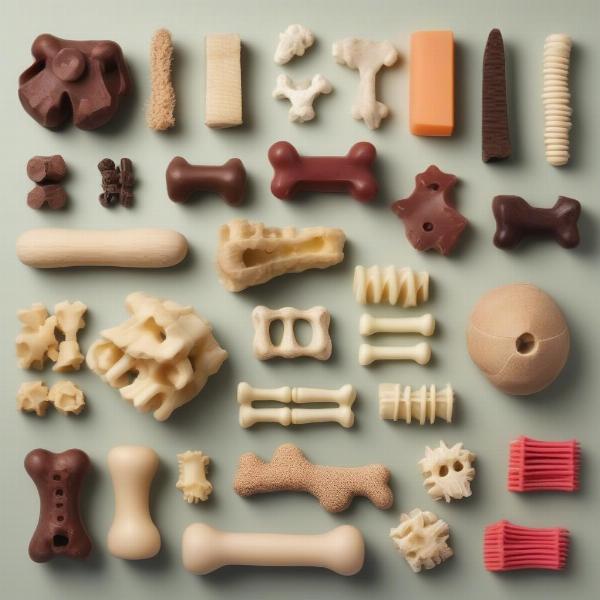No hide dog bones have become increasingly popular as a chew treat for dogs. But are they truly a safe and healthy option? This article will delve into the potential benefits and risks of no hide bones, providing you with the information you need to make informed decisions about your dog’s dental health and overall well-being. We’ll explore alternative chew options and discuss how to choose the right chew for your furry friend.
Understanding the Appeal of No Hide Dog Bones
Many dog owners are drawn to no hide bones as a seemingly natural and long-lasting chew. They are often marketed as a safer alternative to rawhide, which can pose choking hazards and digestive issues. No hide chews are typically made from compressed materials like potato starch, rice flour, or other plant-based ingredients, making them more digestible than rawhide. However, it’s important to note that “no hide” doesn’t automatically equate to “safe”.
Potential Risks of No Hide Dog Bones
While generally considered safer than rawhide, no hide dog bones still present potential risks. Some dogs may experience allergic reactions to the ingredients. Additionally, these chews can be very hard, potentially leading to chipped teeth, especially in aggressive chewers. Smaller pieces can also break off and become lodged in the throat or digestive tract, causing choking or blockages.
Choosing the Right Chew for Your Dog
Selecting the right chew for your dog depends on several factors, including size, age, chewing habits, and any existing health conditions. Always supervise your dog while they are chewing on any treat. For aggressive chewers, consider softer chews made from natural rubber or nylon. Puppies and senior dogs may benefit from softer, more easily digestible chews.
 Variety of Dog Chews
Variety of Dog Chews
Healthy Alternatives to No Hide Dog Bones
Several healthy and safe alternatives to no hide bones exist. no hide bones for dogs made from sweet potato or other digestible ingredients can be a good option. Chicken necks for dogs, under supervision, can provide essential nutrients. Nature’s own dog chews like bully sticks or antlers can be long-lasting and satisfying. Consider a big dog bone for larger breeds. Always ensure the chew is appropriately sized for your dog to prevent choking. Play on dog toys are a great addition for entertainment and stimulation.
Conclusion
No hide dog bones can offer a longer-lasting chew compared to rawhide, but they are not without potential risks. Careful consideration of your dog’s individual needs and chewing habits is crucial when selecting any chew treat. Always supervise your dog and consult your veterinarian if you have any concerns about their dental health or dietary needs. Choosing a safe and appropriate chew can contribute to your dog’s overall health and happiness.
FAQ
- Are no hide bones completely safe for all dogs? No, no hide bones are not completely safe for all dogs. Some dogs may experience allergic reactions or dental issues.
- What should I do if my dog chips a tooth on a no hide bone? Contact your veterinarian immediately.
- What are some signs my dog is choking on a chew? Pawing at the mouth, excessive drooling, gagging, and difficulty breathing are signs of choking.
- Can puppies have no hide bones? Puppies should be given softer, more easily digestible chews.
- Are there any benefits to giving my dog chew treats? Chewing can help clean teeth, reduce plaque buildup, and provide mental stimulation.
- How often should I give my dog a no hide bone? No hide bones should be given sparingly, as an occasional treat.
- What should I look for when choosing a dog chew? Consider your dog’s size, age, chewing habits, and any allergies.
ILM Dog is a leading international online resource dedicated to providing expert advice and guidance on all aspects of dog care and well-being. From breed selection and health care to training and nutrition, ILM Dog offers a wealth of reliable and practical information to help dog owners worldwide. We strive to empower dog lovers with the knowledge and resources they need to nurture happy and healthy canine companions. Contact us for any questions regarding your canine friend via email at [email protected] or phone at +44 20-3965-8624. For more information on dog breeds, health, and training, visit ILM Dog.